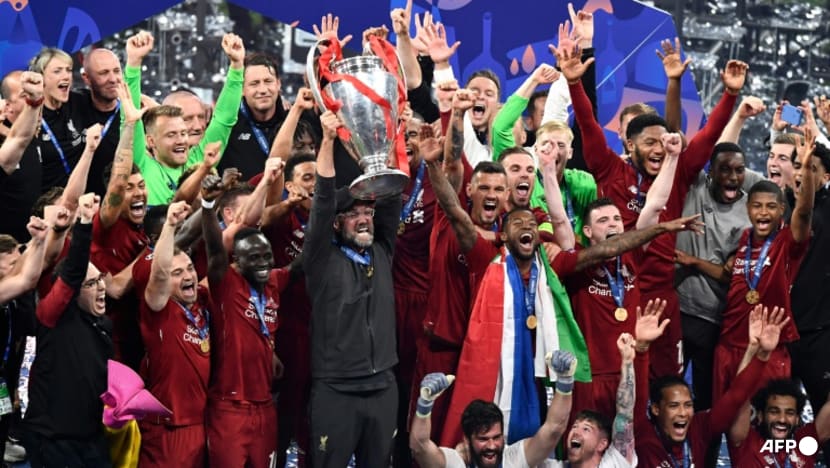Commentary: Klopp leaving Liverpool is a good thing
Whoever next occupies the Anfield hotseat will inherit a very strong set-up at all levels, one that is much stronger than when Jurgen Klopp arrived in 2015, says sports writer John Duerden.

Jurgen Klopp lifts the Champions League trophy after Liverpool beat Tottenham to win the 2019 final. (Photo: AFP/OSCAR DEL POZO)

This audio is generated by an AI tool.
SEOUL: I still remember the shock of Kenny Dalglish resigning as the manager of my football club. Just a month after leading Blackburn Rovers to the English Premier League title in 1995, the Scot announced, completely out of the blue from the perspective of fans, that he was stepping down.
Yet Dalglish had done it before. Four years earlier, he had also shocked the football world with his sudden resignation from Liverpool, citing burnout and the emotional strain from the Hillsborough disaster. At the time, the Reds were champions but they were not going to win another domestic title for 30 years.
Jurgen Klopp, who was appointed manager of Liverpool in October 2015, ended that famine and now it is his turn to drop a bombshell. The German’s announcement on Friday (Jan 26) that his tenure at the club will end with the current season was a massive shock.
It has raised fresh scrutiny over burnout in a relentless job that can cause serious stress on self and family.
“It is that I am - how can I say this - running out of energy ... I know that I cannot do the job again, and again, and again, and again,” 56-year-old Klopp said in explaining his decision to leave after nine years with the club.
Likening himself to a sports car, he said: “I’m like a proper sports car - not the best one but a pretty good one. I can still drive 160, 170, 180 mph, but I’m the only one who sees the tank metre is going down. The outside world doesn’t see that ... so you go as long as you have to go, but then you need a break.”
BURNOUT DOES NOT DISCRIMINATE
In football, the spotlight often shines on the players. However, behind the scenes, coaches and managers face constant pressure to deliver results, often with minimal respite.
The demands of managing a team extend far beyond the 90 minutes on the pitch. The intense schedules, long training sessions and constant analysis of the game leave little room for downtime.
Research in sport psychology consistently highlight the stress linked to leadership roles in high-performance sports. As many as one in four coaches feel a high level of fatigue at the end of a competitive season, according to a 2015 study by Marte Bentzen at the Norwegian School of Sport Sciences.
“This career ... is only possible if you are very busy and 100,000 per cent committed to everything you do and you dedicate your whole life to it. I don’t want to wait until I am too old for having a normal life,” said Klopp.
BUILDING UP THE TEAM
That Klopp was able to recognise his limits speaks mountains about his professionalism and leadership. In leaving before he is totally spent, he is putting the club and players before himself.
When Klopp arrived after a successful tenure with Borussia Dortmund, Liverpool were in 10th place. As well as the FA Cup, League Cup and the Premier League, Klopp famously led the Reds to three UEFA Champions League finals, losing two to Real Madrid but beating Tottenham Hotspur in 2019.
There was also the Club World Cup a few months later. The only major trophy he didn’t lift was the Europa League, although Liverpool reached the 2016 final. They are going well in the current version; it would be fitting if Klopp ends his time with that piece of silverware.
Yet it is not just about the titles. There is the recruitment, the coaching and the development of players. The likes of Mohamed Salah, Sadio Mane and Virgil van Dijk were respected as good players when they arrived at Anfield but they, under Klopp, went on to become world-class talents. Relatively unknown youngsters such as Andy Robertson and Trent Alexander-Arnold became perhaps the best full-back pair in Europe.
Klopp is known for his celebrations on the sidelines not only when the team scores, but also in front of the fans at the end of games. In December 2015, shortly after arriving from Borussia Dortmund, he gathered his players, arm in arm, to salute the Kop, Liverpool’s famous terrace, after a 2-2 draw with West Bromwich Albion.
He was roundly mocked by pundits for “celebrating” a draw, yet those bonds between the players, supporters and coach have been there for all to see. It was never more visible when Liverpool came back from a 3-0 first leg defeat against Barcelona in the semi-final of the 2018-19 UEFA Champions League to win 4-0 in front of a bouncing Anfield Stadium.
As an elite “rock star” manager, Klopp will be missed by the English Premier League, though maybe not so much by fans of rival Manchester United who know what can happen when a long-serving elite coach leaves. Alex Ferguson departed Old Trafford in 2013 after winning 13 league titles in 20 years, and United quickly fell away and have yet to win another championship. They currently sit seventh in the league, 16 points behind leaders Liverpool.
Related:
LEAVING BEHIND A STRONG INHERITANCE
Whoever next occupies the Anfield hotseat will inherit a very strong set-up at all levels, one that is much stronger than when Klopp arrived back in 2015.
Goalkeeper Alisson Becker, defender Van Dijk and star forward Salah are all in their early 30s but are also in fine physical condition and set to play for some time yet. The likes of Joe Gomez, Diogo Jota, Luis Diaz, Alexander-Arnold, Cody Gakpo and Darwin Nunez are around their mid-20s and about to enter their peak footballing years. Then there are talented young players coming through such as Curtis Jones and Harvey Elliott. The squad does not need major surgery.
And it will be easier to attract top players as Liverpool are, once again, regarded as one of the world’s top clubs. This was not the case when Klopp arrived with the club finishing outside the top five for five of the previous six seasons. Off the pitch, the club’s academy, recruitment department and sports science are regarded as among the very best.
Perhaps the danger could be that some of the big stars will see Klopp’s departure as a good time to consider their future. When asked whether he sees himself as part of the next era, Van Dijk said,"That's a big question. I don't know."
Such concerns fuel hope that Klopp may change his mind as the team looks set for more success. It is unlikely.
A fatigued manager does not benefit anyone. Klopp’s style is certainly all-in, on and off the pitch, and it's understandable that he needs a break.
“He has the courage to say I’m going to step out of this. A lot of people would crash and burn instead. I sort of admire him. I imagine the life of a coach in that kind of world is just unrelenting,” said Michael Leiter, co-author of The Burnout Challenge: Managing People’s Relationships With Their Jobs.
Football at the top level certainly is. Klopp is one of the best managers in the world and will always be a Liverpool legend. After a rest, he will surely bounce back and have more success elsewhere. Due to his work, Liverpool will hope to do the same but whatever happens, he is going to be an incredibly hard act to follow.
John Duerden is a Seoul-based writer who covers the sporting scene. He is the author of four books including Lions & Tigers - The History of Football in Singapore and Malaysia (2017).















